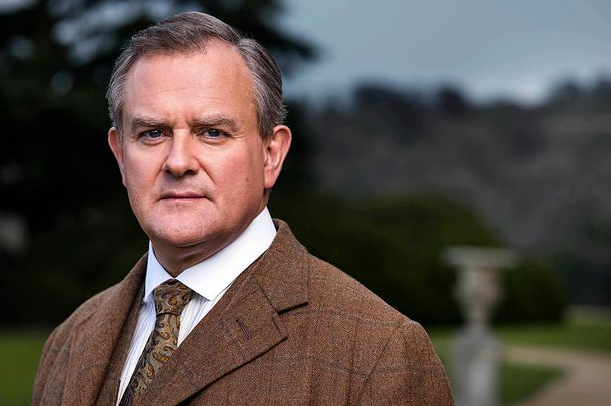Hugh Bonneville is British stage, film, television and radio actor, best known for playing loving father Robert Crawley, Earl of Grantham. Here, Hugh describes how he is sad to see the end of Downton, his personal highlights and what he will always remember from the award-winning drama…

Q: How sad were you when you realised that Downton was coming to an end?
A: It was sad, although from a personal experience it has been a ridiculously happy six years doing a project that we all love, sharing the workload and sharing the friendships. It felt strange to be finishing but it is the right thing to do. It will feel strange next spring when we are not putting on thermal underwear to start filming again in freezing cold Highclere Castle. I think it will take a couple of years to sink in, for us to realise what it means to us all. Right now it is just a very happy, pleasant memory.
Q: Lord Grantham is often seen as slightly conservative but in the final season he is looking forward and embracing the future…
A: Yes. He reminds me more of the Robert from the very first season, and that is what attracted me to the character. He is conservative by nature and by definition — because he is conserving the estate and his sole purpose in life is to hand it on to the next generation. But he is a man of liberal instincts, and that ebbs and flows through different series, when he became at times an emotional dinosaur and couldn’t see things that were staring him in the face. His IQ dipped at times, too, I thought. [Downton creator] Julian Fellowes, though, always writes redemptive qualities into all his characters. Season 6 starts with a bang when we go and visit our friend Sir John Darnley (Adrian Lukis) and his estate at Mallerton being sold off. Darnley says to Robert that he shouldn’t make the same mistake; it’s no use sticking your head in the sand and hoping everything is going to stay the same because it’s not. Things have changed and we can no longer make the income outstrip the expenditure. That’s a real wake up call, literally, seeing the family portraits sold off. Robert goes back to Downton and knows he has to make changes. And with Mary now strongly at his side, running the estate, they’ve got a good chance.
Q: How has your anonymity been affected? Can you stroll the streets of London without too much hassle?
A: No, not really, not anymore. It’s just a by-product of the ways things are. In the age of the camera phone it’s a bit weird when you’re sitting having dinner in a restaurant and people think they’re being very subtle taking a photo while in fact they’re being very obvious. When you’re in a middle of a mouthful with friends or family and people come up asking for a photograph, that’s when you want to say, ‘Actually, I’m going to say no; I’d like to finish my meal. This is my time.’ It happened not so long ago in Bampton in Oxfordshire [the village when much of Downton was filmed]. I was having some breakfast and my fork was literally to my mouth when someone asked for a photograph. In the end, he waited until I had finished and he took a photograph with me outside. I think it’s because of the prevalence of the camera phone and the selfie. We did a press day in New York last Christmas and it was the first time that not a single person asked for an autograph. They all asked for a selfie. It’s a different mind-set. It is something to show rather than something to collect.
Q: What have been some of your personal highlights from across the six seasons?
A: I think the whole sequence around the death of Sybil in Season 3 was very beautifully written and the story it gave us between Robert and Cora (Elizabeth McGovern) was wonderful to play, very fractious, and very well handled. I really enjoyed the Simon Bricker, the art historian, storyline. That was a hoot — I love Richard E. Grant — and it was a great scrap that we had. There’s some stuff in Season 6, which is my absolute favourite. I had to read it twice before I could take it in. It’s a fun moment for the audience!
Q: Have you got any mementos from the series?
A: I liberated a letter that was written. One of my great affections for the show is the detail to which the art department go in everything they do. All the letters or telegrams that we receive at the breakfast table or the study or wherever, which the audience never sees, are always beautifully composed. They’re written accurately and appropriately to the scene we are in. I pinched one from Matthew Goode’s character, Henry Talbot, writing to invite us to some event. So that’s going in the scrapbook.
–
FIND OUT
What Michelle Dockery’s last day on set felt like and Lesley Nicols standout moments from the show..
–
DOWNTON ABBEY SERIES 6 IS AVAILABLE ON BLU-RAY AND DVD ON 16TH NOVEMBER, COURTESY OF UNIVERSAL PICTURES (UK)
–